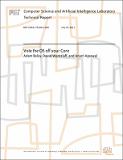| dc.contributor.advisor | Anant Agarwal | |
| dc.contributor.author | Belay, Adam | en_US |
| dc.contributor.author | Wentzlaff, David | en_US |
| dc.contributor.author | Agarwal, Anant | en_US |
| dc.contributor.other | Computer Architecture | en |
| dc.date.accessioned | 2011-07-28T17:45:15Z | |
| dc.date.available | 2011-07-28T17:45:15Z | |
| dc.date.issued | 2011-07-27 | |
| dc.identifier.uri | http://hdl.handle.net/1721.1/64977 | |
| dc.description.abstract | Recent trends in OS research have shown evidence that there are performance benefits to running OS services on different cores than the user applications that rely on them. We quantitatively evaluate this claim in terms of one of the most significant architectural constraints: memory performance. To this end, we have created CachEMU, an open-source memory trace generator and cache simulator built as an extension to QEMU for working with system traces. Using CachEMU, we determined that for five common Linux test workloads, it was best to run the OS close, but not too close on the same package, but not on the same core. | en_US |
| dc.format.extent | 6 p. | en_US |
| dc.relation.ispartofseries | MIT-CSAIL-TR-2011-035 | |
| dc.rights | Creative Commons Attribution 3.0 Unported | en |
| dc.rights.uri | http://creativecommons.org/licenses/by/3.0/ | |
| dc.title | Vote the OS off your Core | en_US |
| dc.language.rfc3066 | en-US | |
